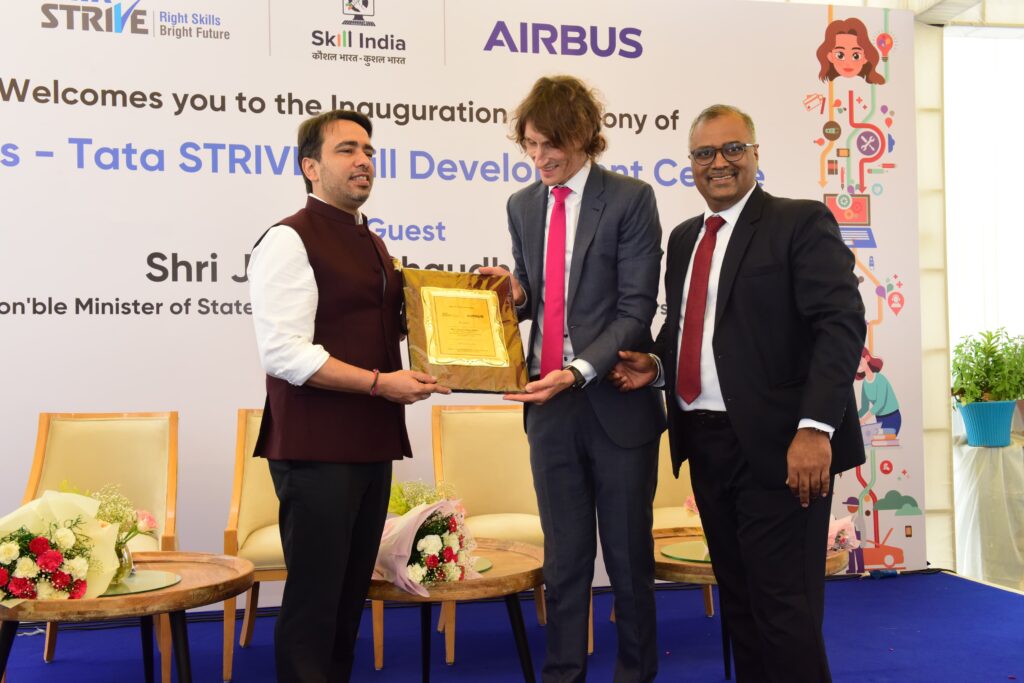Chandigarh 19th September 2024: Tata STRIVE, the skill development initiative of Tata Community Initiatives Trust (TCIT) and Airbus India Private Limited have extended their partnership in the areas of skill development and livelihood generation. As part of this joint initiative, a skill training centre called Airbus- Tata STRIVE Skills Training Centres are being established. The partnership aims to provide a platform to the students who want to make their careers in digital courses gaining valuable exposure in the training infrastructure that has been established at the centre.

During his address, Shri Jayant Chaudhary, Hon’ble Minister of State (I/C), Ministry of Skill Development and Entrepreneurship mentioned, “I am delighted to launch the two skilling centers in Delhi and Bangalore in partnership with Tata Strive and Airbus, marking a significant step in equipping our youth with future-ready skills. During my visit to the center, it was inspiring to meet the bright and ambitious candidates who represent India’s next generation of innovators. This collaboration in critical sectors like Infrastructure, Logistics, Aerospace, and Defense highlights the importance of aligning skilling programs with the evolving needs of industry and the labor market. By leveraging India’s strengths and tailoring our approach to local demands, MSMEs, and state policies, we can meaningful opportunities for every individual across geographies.”
“Tata’s deep social engagement with national priorities is commendable, and I urge Airbus and Tata to further their efforts in skill development and higher education on a continuous basis. By integrating skilling with formal education, we can create a seamless path for students to explore new horizons and enhance their competencies in tandem with industry needs. Our youth must continuously aspire to reinvent themselves and embrace lifelong learning. The 120 students trained here will not only be skilled but confident, ready to soar higher. Airbus doesn’t just help the candidates fly—it inspires them to aim for new heights in both education and skills,” he added.
Other dignitaries present at the event were Ms. Sonal Mishra, Joint Secretary, MSDE, Mr. Ameya Vanjari, COO, Tata STRIVE, Mr. Remi Maillard, President and MD, Airbus India and South Asia.
Located at Dwarka in New Delhi and Nagavara in Bengaluru, Karnataka, the institute is well equipped to train youths in each centre, placement linked skill training programs, spanning IT, Electronics and Aviation sectors, through courses such as AWS Cloud Computing, Junior Full Stack Developer and Cyber Security. Based on mutual agreement between both parties, courses in Aviation and Aero Space may also be introduced in future. The courses will be short term in nature, with duration ranging from 3 to 6 months, and would aim to provide sustainable livelihood opportunities to the trained and certified youth.
Tata Group, long regarded as one of the most responsive and ethical business groups in India, responded to this national challenge by establishing the Tata Community Initiatives Trust (TCIT) in 2014. Tata STRIVE, an initiative under TCIT, address the pressing need of skilling India’s youth for employment, entrepreneurship, and community enterprise. Tata STRIVE aims to skill young people in the age group 18-35 years for jobs/entrepreneurship, with a special focus on youth from disadvantaged communities, including women, people with disabilities, SC/ST etc. The training process and course content is customized to enable youth to successfully transition to the workplace and thrive in it. Over the past decade Tata STRIVE has positively impacted more than 1.7 million lives through various direct and indirect skilling programs.
The youth from Delhi NCR and Karnataka will be the biggest gainer from the institutes. The institutes with its state-of-the-art facilities and future expansion plans will meet the demands to a greater extent. The Airbus-Tata Strive centres in Delhi and Bengaluru aim to upskill more than 900 youth from economically underprivileged sections of society over a period of three years.